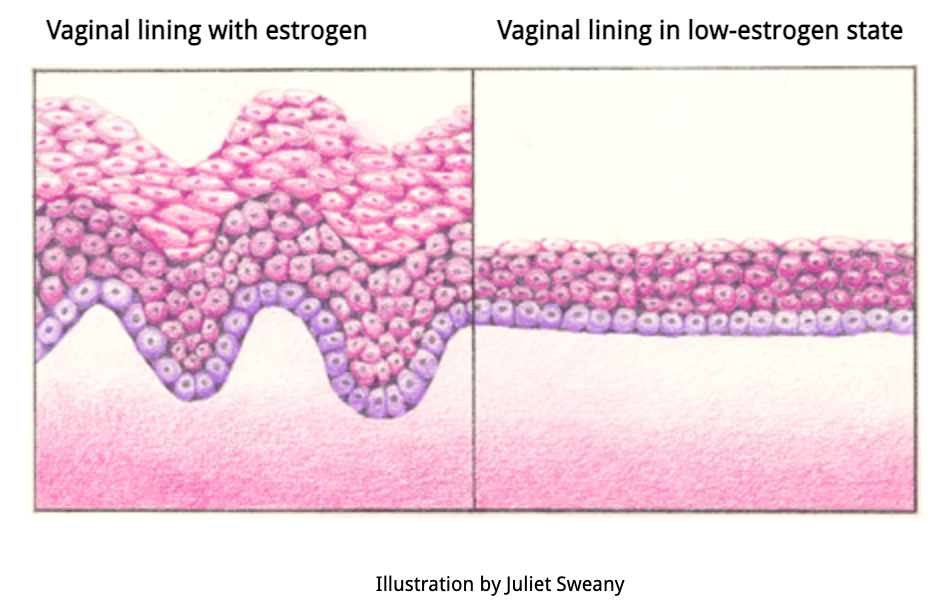How Low Estrogen Levels Impact Vaginal Lining
Our hormones take on many important roles in the body, acting as messengers for different systems and processes. As we age, hormone levels begin to change and we can see the effects of this shift on the body. Estrogen is a primary female hormone closely tied to youth and the aging process, and a decreasing production of estrogen through perimenopause and menopause has an impact on the appearance and behavior of skin.
The Hormones of Youth
Lower levels of estrogen along with decreases in collagen and elastin (which are proteins responsible for skin’s strength, resilience, and flexibility), cause increased dryness and wrinkling, and decreased defense against oxidative stress. The effects of lower estrogen levels are seen not only on the skin of the face and body, but also impact the tissues of the vulva and vaginal lining, which become thinner, dryer, and more vulnerable to tears, injury, and pain.
The decrease in vaginal secretions with reduced estrogen production as we age results in less lubrication, which can make intercourse painful. If a woman becomes sexually inactive through menopause, the vagina can become narrower and shorter, causing more irritation with penatration. The problem then becomes that a woman may avoid intercourse because of the resulting discomfort, which worsens these symptoms over time and makes the vagina more susceptible to injury.
In addition to vaginal dryness and reduced elasticity, the pH levels increase with age and make the vagina less acidic in menopause (similar to pre-pubescent levels). This change in pH also makes the vagina more susceptible to urinary tract infections and yeast infections.
Not all women experience these vulvovaginal symptoms through menopause; however, they’re a fairly common result of reduced estrogen levels with aging. Dryness and discomfort with intercourse can cause a strain in your relationship but is possible to overcome this with open communication, support and patience; broaching this conversation might even create more closeness and intimacy between you and your partner.
Diagnosing estrogen imbalance
The first step in determining hormone levels and diagnosing an imbalance is to undergo testing with saliva, urine or blood samples. At Divine Elements, we offer a number of options for hormone tests, with the most comprehensive and popular choice among women being the DUTCH Test through Precision Analytical. Urine is collected at four different times throughout the day, providing more information on your reproductive and adrenal hormones than with a basic blood draw or saliva test. DUTCH also tests metabolites, giving us a deeper understanding of the behavior of our hormones rather than simply analyzing their levels.
Watch this short video about testing sex hormones with DUTCH
Treatment Options for Vulvovaginal Dryness and Skin Changes:
Hormone therapy - bioidentical hormone therapy is one treatment option for low estrogen levels, although it’s not the only path that can be taken to achieve better balance. After diagnostic testing is complete, your doctor will prescribe the necessary hormones to support your body. Estrogen isn’t the only hormone that impacts the youthfulness of skin (testosterone, human growth hormone and DHEA are also linked to health and integrity of the skin) so it’s important to find the right combination and dosage for your particular needs.
Supplementation - UltraFlora Women’s is a unique probiotic that helps maintain healthy vaginal microflora and support urogenital health. Another popular option is Ion Biome spray, which also supports a balanced vaginal microbiome and provides moisture to the sensitive lining of the vagina. (Reach out to our team for support in finding this supplement).
Eliminate processed foods - highly processed foods put a strain on the immune system and may compromise the balance of your microbiome. These foods can worsen the symptoms of vaginal dryness, irritation, and painful intercourse, and increase your risk of experiencing yeast infections and UTIs. Focus on eating a balanced, whole food diet with fermented vegetables, kefir, yogurt and other probiotic foods to support your gut and vaginal microbiomes.
Sitz baths - some women may be familiar with using sitz baths after recently giving birth. These baths can be helpful with relieving pain and irritation, itching, and minor inflammation of the vulva or vagine. It consists of a shallow bath of warm water, with minerals (like salt or baking soda) added for extra support; while this isn’t a prescription treatment, it’s most helpful to consult with your family doctor or naturopathic physician to determine the right minerals to add and in what quantities.
While this might feel like a somewhat uncomfortable conversation, being open with your partner about what you’re experiencing will ensure you’re supporting your needs and boundaries while nurturing the intimacy and honesty in your relationship. Talk to your partner about the symptoms you’re experiencing, reach out to your naturopathic physician for support, and remember that this is a very common experience among women in menopause - if you feel brave enough to bring it up with your friends, you’ll probably find that some of them can relate!
Book a visit with me, at Divine Elements Wellness Centre or online, to talk about how we can support your hormones and your overall health and wellness.



